| | | | Policy Brief Special February 2024
Turning the tide for
European aviation | |
| | | |
Dear readers,
In just under four months' time, Europe will go to the polls. From 6 to 9 June 2024, 350 million Europeans will be called upon to cast their vote. This election is of immense importance because Europe needs both stability and a clear change of direction, particularly in economic and transport policy. A central task of future European politics must be to strengthen the EU's competitiveness and thereby securing value creation and prosperity. This applies especially to aviation. The EU internal market creates broad and reliable connectivity within Europe. By connecting Europe and the world, air transport not only strengthens our economic power, but also the independence and sovereignty of the continent. Values that are becoming increasingly important in times of geopolitical crises. Flying serves as the basis for trade, tourism, and intercultural encounters. However, the political decisions of the past legislative period have largely lost sight of much of this. The European Green Deal as a political priority leads to massive disadvantages for the aviation industry in international competition. European airlines are unilaterally confronted with increasing regulations and costs, while non-European airlines continue to fly largely unaffected by climate protection regulations. At the same time, the already generous traffic rights for a state airline from the Gulf have been significantly expanded - with the result that Qatar Airways will operate with 35 per cent more capacity for flights to Germany this winter than 2021. With transfer flights in Doha, the strict European climate protection regulations are circumvented. This is extremely contradictory and an own goal at the expense of the environment and our competitiveness. Dear readers: It is time to correct this course! Europe must now turn the tide and pursue a policy in which competitiveness and climate protection go hand in hand. This is both necessary and possible. On the following pages, you can read our proposals for measures that promote innovation, ensure fair competition and protect the rights of passengers and employees alike. Enjoy reading! Andreas Bartels
Head of Corporate
Communications
Lufthansa Group | Dr. Kay Lindemann
Head of Corporate
International Relations and
Government Affairs
Lufthansa Group |
| |
| | | | Enabling European connectivity and integrationThe establishment of a strong European aviation industry must become a priority for European policy makers to uphold European economic competitiveness and strategic autonomy.From the early days of the world’s first passenger airline service to the sophisticated travel networks of today, aviation was boosting freedom and European integration. Connecting people, cultures, and economies across Europe and beyond: Aviation reflects the essence of European values and is contributing significantly to the integration and cohesion of EU Member States. EU aviation under pressure
European aviation has propelled economic growth through increased trade and tourism. Beyond that, even in times of crisis, European airlines uphold global supply chains, repatriate stranded EU citizens, and provide rapid transportation of essential supplies, such as medical goods. The societal and economic value of aviation to European independence and sovereignty is undeniable. Now, this value is at risk: European aviation is critically threatened by increasing costs imposed by EU regulation and competitive advantages of non-EU carriers. The result is a distorted level playing field. Turning the tide
It is high time for European policy makers to turn this tide. Europe needs a strong aviation industry to contribute to its climate transformation and strategic autonomy. A thorough review of the European Green Deal and especially RefuelEU Aviation is therefore essential, focusing on bolstering and safeguarding the European economy. We need a true European industrial policy, that restores European competitiveness and eases the one-sided costs imposed on European network airlines. This must become the priority during the next legislative term. | |
| | | | Key priorities- Promote global competitiveness
Review the European Green Deal to strengthen Europe’s economy - Drive both sustainability & competitiveness
Introduce a European Climate Fee for non-EU and EU carriers to finance SAF - Safeguard the EU’s strategic autonomy
Facilitate airline consolidation and foster European interests globally
| |
| | | | A competitive & sustainable aviation sectorThe EU must promote the competitiveness of its network airlines and guarantee a level playing field in a global context by making EU climate legislation effective and Carbon Leakage proof.Lufthansa Group has set itself ambitious climate protection goals aligned with the Paris Agreement and the EU’s emission reduction targets. By 2050, Lufthansa Group aims to operate CO₂-neutrally, with more fuel-efficient aircraft, the use of Sustainable Aviation Fuel (SAF), the expansion of intermodal transport, and innovative operational measures. The Fit for 55 Package of the European Commission implements a set of legislative initiatives to meet the EU’s climate goals. Three have a significant impact on aviation:
1. The reform of the EU Emissions Trading System (ETS),
2. ReFuelEU Aviation, and the
3. Energy Taxation Directive Revision (ETD) including a Kerosene Tax (under discussion). EU ETS and ReFuelEU Aviation, already passed by legislators, in their current design, significantly weaken the competitive position of globally operating EU airlines. ReFuelEU Aviation in particular, with its blending mandate for SAF, makes traffic via EU-hubs massively more expensive and, above all, one-sided. Because long- and short-haul connections starting within the EU require the use of more expensive SAF. Connections via hubs right behind EU-borders are hardly affected: If passengers change flights outside EU-borders to reach a long-haul destination, only the first shorter transfer flight requires SAF fueling. Especially non-EU airlines with hubs in Istanbul, Doha and Dubai benefit from this situation and can offer significantly lower ticket prices. Therefore, it is crucial to utilize the review process included in the ReFuelEU Aviation Regulation to rectify this imbalance and ensure comparable treatment of non-EU airlines and their EU counterparts. | |
| | | | “Fit for 55” extra costs per ticket 2035 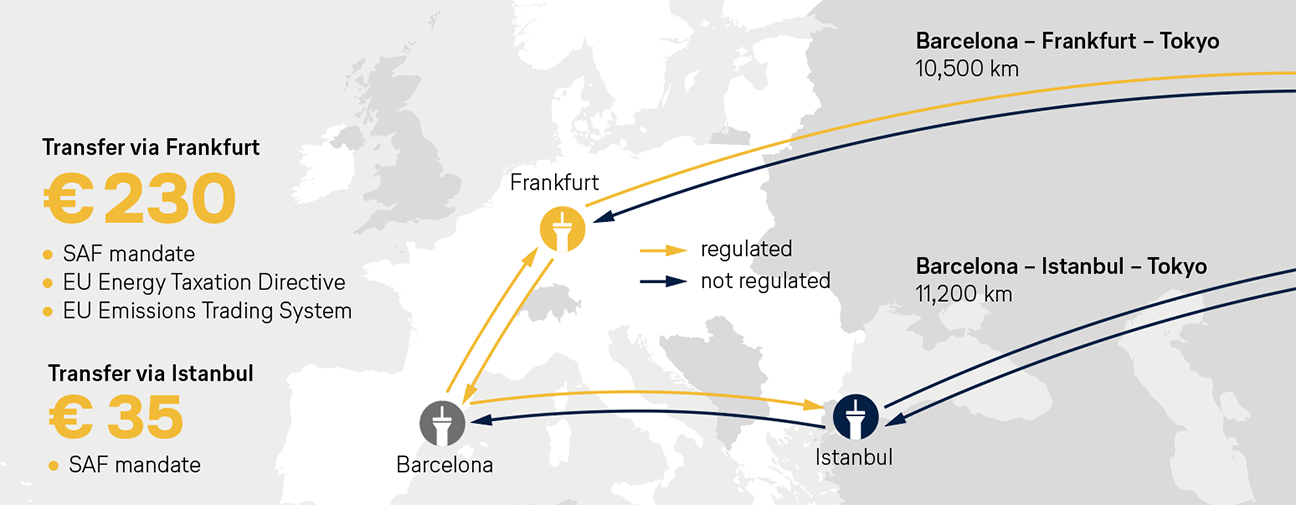
| |
| | | | To restore a global level playing field, corrections are needed: - Introducing a European Climate Fee: A fair and simple solution would be the introduction of a European Climate Fee applicable to all airlines based on the passengers’ final destination. The generated revenues could serve to establish a self-sustaining financing mechanism for the purchase of SAF according to the blending mandates. This approach creates a level playing field between EU airlines and their non-European competitors while preventing Carbon Leakage.
- Boosting SAF upscaling: The EU’s Net Zero Industry Act (NZIA) enables Europe to take on a pioneering role in sustainable fuels. It supports the production and use of SAF to go along with ReFuelEU mandates. To close the price gap between conventional kerosene and SAF, Member States need to act. Now it is up to national legislators to provide funds to put SAF upscaling into practice.
- Applying CBAM to air transportation: The application of the Carbon Border Adjustment Mechanism (CBAM) to air transportation would support emission abatement measures in a competitive global environment. A level playing field for EU- and Non-EU airlines could be restored.
| |
| | | | Safeguard EU’s strategic autonomyThe EU must maintain a robust network of airlines and hub airports to avoid dependence on non-EU carriers and infrastructures, ensuring control over its air travel policies, connectivity, and security. | |
| | | | Hubs guarantee efficient and more sustainable connectivity - Hub
Connecting 12 destinations with single transfer via a hub requires 12 routes. Cities with lower demand benefit from the variety of hub connections. - Point-to-point
Connecting 12 destinations directly requires 66 routes and correspondingly high local demand between the cities.
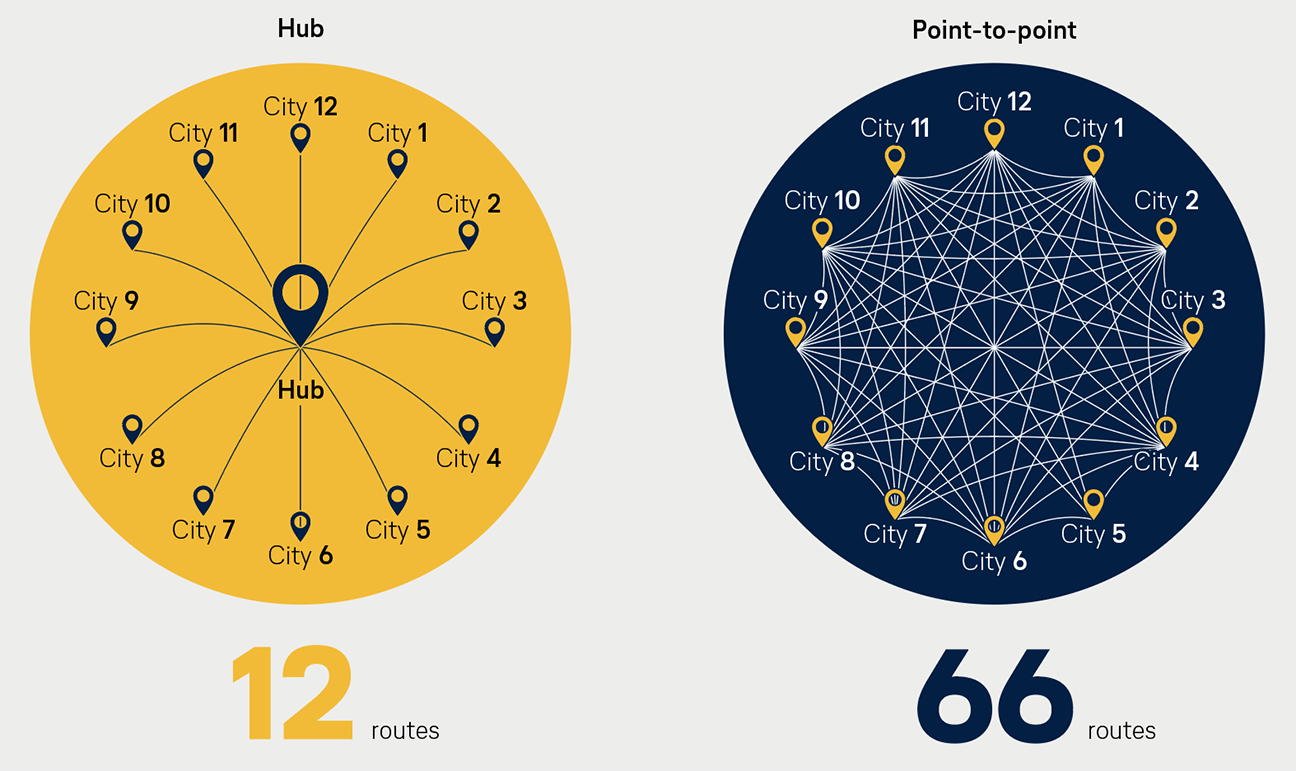
| |
| | | | Network carriers provide efficient connectivity, extending the reach to remote areas in Europe and surpassing the capabilities of point-to-point services. These carriers play a crucial role in contributing to Europe's growth and prominence as a global leader in the tourism industry. Network airlines and hubs are vital for the EU's ability to respond effectively to geopolitical challenges, economic fluctuations, and unforeseen crises. A strong European aviation safeguards the EU’s strategic autonomy and resilience. To maintain the international competitiveness of European aviation and ensure a free and independent transport of people and goods, a consolidated European airline market is vital. Since only airlines of sufficient size can compete globally, it is more important than ever to strengthen European airlines. This will ensure and even increase the connectivity of Europeans. | |
| | | | Align international air transport agreements with EU interestsEurope can achieve a win-win situation: boosting the EU's strategic autonomy, benefitting both the EU and its citizens, while fostering fair competition for EU airlines. | |
| | | | Travellers flying from Europe to Asia:
Non-European hubs like Istanbul, Doha and Dubai benefit from asymmetrical regulation 
| |
| | | | Recently, the EU’s external aviation policy has become increasingly unbalanced, granting non-EU airlines unrestricted access to the EU market without reciprocating similar commercial opportunities for the EU industry and the same level of regulatory obligations. To preserve fair competition and boost the EU’s strategic autonomy, improvements have to be made in global air transport agreements: both existing and future agreements must incorporate binding and enforceable provisions on environment, social issues, and fair competition. This will contribute to a level playing field for all carriers. | |
| | | | Clarify passenger rightsThe EU must revise the European Passenger Rights regime to provide legal clarity for both consumers and airlines.The current EU Air Passenger Rights Regulation (EC 261/2004) is highly ambiguous and has become one of the most challenged pieces of EU legislation before European courts. Moreover, disproportionate consumer protection decreases airline’s capabilities to invest in modern aircraft and SAF. EU Member States must therefore stop stalling and continue the work on this important revision. | |
| | | | Support innovation and modernizationA sustainable aviation future requires innovation. The EU must ensure that the regulatory framework enhances innovative technologies to make flying more attractive: less delays and saving emissions. | |
| | | | The AeroSHARK effect 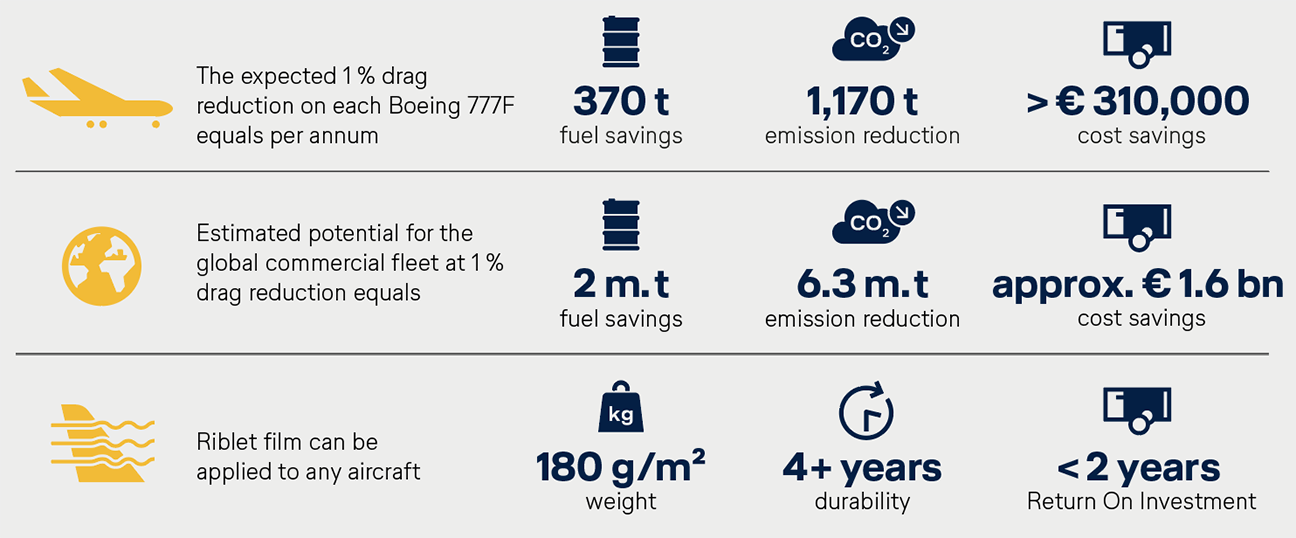
| |
| | | | Lufthansa Group is at the forefront of technological innovation: 200 brand new, more sustainable aircraft in service by 2030 will reduce fuel consumption and thus CO2-emissions by up to 30 percent compared to their predecessors – on every flight. Furthermore, Lufthansa Technik and BASF jointly developed AeroSHARK, a bionic adhesive riblet film modeled on the skin of sharks. It is applied to the surface of the aircraft to optimize the airflow, thereby cutting fuel consumption by approximately one percent. While technology contributes to decarbonization, regulation can unfold their potential as well. For instance, a fully implemented Single and Digital European Sky (SES) – harmonizing and modernizing the current fragmented system – is crucial for optimized air traffic and more efficient flight routes. This technology reduces fuel consumption, thereby minimizing aviation's environmental impact, and additionally decreasing delays for passengers. An updated SES regulatory framework must include strong incentives and concrete targets to increase the overall efficiency of the Air Traffic Management (ATM) system. | |
| | | | Protect EU social standards and good working conditionsThe EU must ensure that comparable social obligations apply to and are enforced by all airlines, EU, and non-EU. This is vital for upholding European safety standards and ensuring fair competition.Fair and just working conditions are key to maintain high safety standards and to secure a level playing field. Both EU and non-EU airlines must adhere to the same fundamental social rights. Therefore, legal loopholes that leave the door open for unfair competition must be repaired. This requires combatting the use of fake or fictitious home bases, the use of bogus self-employment and the misuse of the posting of the workers. European aviation and its workers deserve an unambiguous regulatory framework that safeguards fair competition. | |
| | | | LUFTHANSA GROUPYour Contacts Show PDF Show PDF
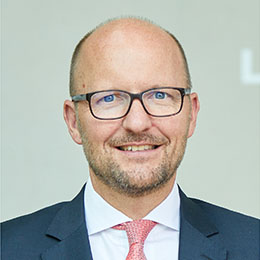
Andreas Bartels
Head of Corporate
Communications
Lufthansa Group  +49 69 696-3659 +49 69 696-3659
 andreas.bartels@dlh.de andreas.bartels@dlh.de
| 
Dr. Kay Lindemann
Head of Corporate
International Relations and
Government Affairs
Lufthansa Group  +49 30 8875-3030 +49 30 8875-3030
 kay.lindemann@dlh.de kay.lindemann@dlh.de
|
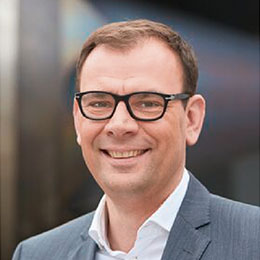
Martin Leutke
Head of Communications
Lufthansa Group  +49 69 696-36867 +49 69 696-36867
 martin.leutke@dlh.de martin.leutke@dlh.de
| 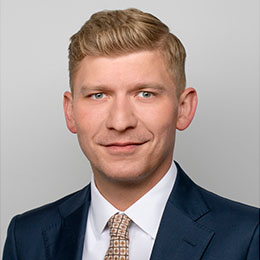
Jan Körner
Head of Government Affairs
Germany and Eastern Europe
Lufthansa Group  +49 30 8875-3212 +49 30 8875-3212
 jan.koerner@dlh.de jan.koerner@dlh.de
|
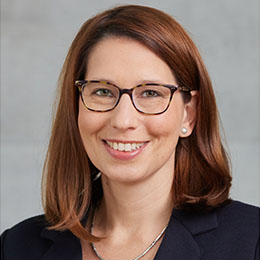
Sandra Courant
Head of Political Communication
and Media Relations Berlin
Lufthansa Group  +49 30 8875-3300 +49 30 8875-3300
 sandra.courant@dlh.de sandra.courant@dlh.de
| 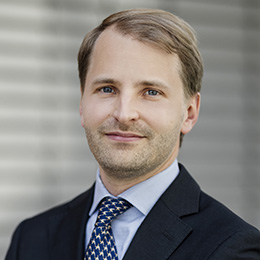
Ruben Schuster
Head of EU Liaison Office
Lufthansa Group  +32 492 228141 +32 492 228141
 ruben.schuster@dlh.de ruben.schuster@dlh.de
|
| |
| | | | Published by:
Deutsche Lufthansa AG
FRA CI,
Lufthansa Aviation Center
Airportring, D-60546 Frankfurt Andreas Bartels
Head of Communications
Lufthansa Group Dr. Kay Lindemann
Head of Corporate International
Relations and Government Affairs
Lufthansa Group Martin Leutke
Head of Communications
Lufthansa Group | Editor in Chief:
Sandra Courant Editorial Staff:
Franziska Feinig, Anton Heinecke, Markus Karassek, Alexander Lutz, Oliver Simonis, Steffen van Eicke Press date:
27 February 2024 Agency Partners:
Köster Kommunikation
GDE | Kommunikation gestalten |
| |
|